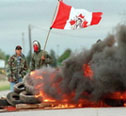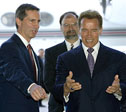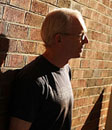The summer of our discontent .. living dangerously in Canada in 2007?
May 31st, 2007 | By L. Frank Bunting | Category: Key Current Issues Usually Canadians can take comfort from the thought that, however crazy things may be in Canada, they are still a lot crazier in the colossal United States next door. But looking out on the sixth month of 2007 it seems possible that things are different this year. Just what is going to happen, e.g., on the Assembly of First Nations’ “national day of action” on Friday, June 29? Then there is the case of Ms. Audrey Vachon, 20, who has lodged a complaint with the Quebec human rights commission against a Montreal gay bar, where she “was told she wouldn’t be served because she was a woman.” And then the California Governator has just made guest appearances in Toronto, Ottawa, and Vancouver. The federal finance minister says Canadian manufacturing is doing fine even with the high dollar, while Canadian Auto Workers erect a “Job Loss Cemetery” on Parliament Hill. The Middle East makes inroads into the Alberta oil patch. And there are more new scandals about the Mounties. Is this country going to hell in a handcart or not?
Usually Canadians can take comfort from the thought that, however crazy things may be in Canada, they are still a lot crazier in the colossal United States next door. But looking out on the sixth month of 2007 it seems possible that things are different this year. Just what is going to happen, e.g., on the Assembly of First Nations’ “national day of action” on Friday, June 29? Then there is the case of Ms. Audrey Vachon, 20, who has lodged a complaint with the Quebec human rights commission against a Montreal gay bar, where she “was told she wouldn’t be served because she was a woman.” And then the California Governator has just made guest appearances in Toronto, Ottawa, and Vancouver. The federal finance minister says Canadian manufacturing is doing fine even with the high dollar, while Canadian Auto Workers erect a “Job Loss Cemetery” on Parliament Hill. The Middle East makes inroads into the Alberta oil patch. And there are more new scandals about the Mounties. Is this country going to hell in a handcart or not?
1. Assembly of First Nations’ “national day of action” on Friday, June 29
 Reading the May 26 Globe and Mail editorial against “The AFN’s rash call” can make you think that the aboriginal political leadership is just as confused about what it is doing as everyone else in Canada these days. As the editors say: “It goes almost without saying that the country’s rail companies will not observe the Assembly of First Nations’ national day of action’ on June 29, by voluntarily submitting to a request’ from AFN chiefs to close crucial national transportation corridors for 24 hours.”
Reading the May 26 Globe and Mail editorial against “The AFN’s rash call” can make you think that the aboriginal political leadership is just as confused about what it is doing as everyone else in Canada these days. As the editors say: “It goes almost without saying that the country’s rail companies will not observe the Assembly of First Nations’ national day of action’ on June 29, by voluntarily submitting to a request’ from AFN chiefs to close crucial national transportation corridors for 24 hours.”
So what’s going to happen on the slated day at the end of the month, if everyone sticks to their current scripts? It will be interesting to wait and see. Meanwhile, a good cause that does need some serious attention still seems buried somewhere in all the theatrical rhetoric, on all sides. Aboriginal peoples are the fastest growing demographic group in the country today. There are a lot of increasingly confused and troubled aboriginal young people out there who need some kind of attention from someone. Whether they think so themselves or not, they are the first Canadians, and Canada today should be doing something for them. If only it wasn’t so confused at the moment itself …
 (And Sam George’s gracious thank you to Commissioner Sidney Linden and the people of Ontario, at the May 31 public release of the final report on the shooting death of his brother Dudley George, at Ipperwash Park a dozen years ago now, nicely showed that there is no ultimately unbridgeable gulf between the aboriginal peoples of Canada and all other Canadians. Especially when non-aboriginal Canadians actually pay some attention, and give some due respect, to what aboriginal Canadians are saying. And no doubt when aboriginal Canadians show some reciprocal respect, and acknowledge that in the end they are Canadians too. Because nowadays we also know that “Canada” itself is an aboriginal word – and that the “existing aboriginal and treaty rights of the aboriginal peoples of Canada are hereby recognized and affirmed,” according to section 35 of the Constitution Act 1982.)
(And Sam George’s gracious thank you to Commissioner Sidney Linden and the people of Ontario, at the May 31 public release of the final report on the shooting death of his brother Dudley George, at Ipperwash Park a dozen years ago now, nicely showed that there is no ultimately unbridgeable gulf between the aboriginal peoples of Canada and all other Canadians. Especially when non-aboriginal Canadians actually pay some attention, and give some due respect, to what aboriginal Canadians are saying. And no doubt when aboriginal Canadians show some reciprocal respect, and acknowledge that in the end they are Canadians too. Because nowadays we also know that “Canada” itself is an aboriginal word – and that the “existing aboriginal and treaty rights of the aboriginal peoples of Canada are hereby recognized and affirmed,” according to section 35 of the Constitution Act 1982.)
2. The case of Audrey Vachon at the gay bar in Montreal … and another Quebec election!
 Three hundred years ago there were a lot of aboriginal people of Canada hanging out at bars in Montreal. (See the writings of the historian W.J. Eccles, e.g., especially Canadian Society During the French Regime [1968]). Who knows just what to make of Ms. Vachon’s complaint that, as a woman, she was refused service at a Montreal gay bar in 2007? One interesting point seems to be that she was there with her father. Another is that in Melbourne, Australia a hotel “that caters to the gay community has successfully won the right to bar so-called straight patrons – and even lesbians.” (Though of course if gay people can do that, then why can’t straight people bar gay people from their institutions, etc, etc?)
Three hundred years ago there were a lot of aboriginal people of Canada hanging out at bars in Montreal. (See the writings of the historian W.J. Eccles, e.g., especially Canadian Society During the French Regime [1968]). Who knows just what to make of Ms. Vachon’s complaint that, as a woman, she was refused service at a Montreal gay bar in 2007? One interesting point seems to be that she was there with her father. Another is that in Melbourne, Australia a hotel “that caters to the gay community has successfully won the right to bar so-called straight patrons – and even lesbians.” (Though of course if gay people can do that, then why can’t straight people bar gay people from their institutions, etc, etc?)
As for the almost instant problems that M. Charest’s minority government in Quebec has run into with its first budget, if this actually does lead to a fresh Quebec provincial election about three or so months after the last one, then we will know that things in Canada nowadays are crazy indeed. But surely they are not quite that bad yet? (Though it might be both entertaining and instructive for the rest of Canada if they were? For better or worse, however, somebody has finally sensibly blinked, and we know by noon on June 1 that M. Charest’s budget has squeaked through the National Assembly.)
3. What was the real point of California Governator’s quick northern tour?
 Well, both Ontario and especially British Columbia have apparently (and in some degree at least) jumped on to the Governator’s new “international” bandwagon to help save the environment (though with some notable characteristic caution in Ontario’s case). There will be some Ontario-California co-operation in stem cell research. And federal Prime Minister Stephen Harper has promised that Canada will be somehow cracking down on the use of the marvelous new communications technology to illegally copy Hollywood movies.
Well, both Ontario and especially British Columbia have apparently (and in some degree at least) jumped on to the Governator’s new “international” bandwagon to help save the environment (though with some notable characteristic caution in Ontario’s case). There will be some Ontario-California co-operation in stem cell research. And federal Prime Minister Stephen Harper has promised that Canada will be somehow cracking down on the use of the marvelous new communications technology to illegally copy Hollywood movies.
The influence of Hollywood is of course otherwise pervasive in Canada, as it has always been. Dalton McGuinty’s best line of the event came when he explained how he has been in Ontario politics for 17 years, and served as premier for close to four years. But when many people saw the pictures of him greeting the Governor of California at the Toronto International Airport, the question they still asked was “Who is that guy shaking hands with Arnold Schwarzenegger?”
 According to Arnold himself, at a lunch organized by the Economic Club of Toronto on Wednesday, May 30: “I’ve come to Canada to tell you something you may find shocking – and yet I hope also encouraging … In spite of disagreements over global warming at the G8 summit or elsewhere, I believe the United States is about to go from environmental problem to environmental problem solver. In fact I believe the United States is the world’s best hope for solving the global warming crisis.” Mmm … well, maybe in California? Or is the Governor’s party really going to lose big time federally in 2008? (Or are George W. Bush’s latest musings on the crisis meant to be for real? Shurely not?)
According to Arnold himself, at a lunch organized by the Economic Club of Toronto on Wednesday, May 30: “I’ve come to Canada to tell you something you may find shocking – and yet I hope also encouraging … In spite of disagreements over global warming at the G8 summit or elsewhere, I believe the United States is about to go from environmental problem to environmental problem solver. In fact I believe the United States is the world’s best hope for solving the global warming crisis.” Mmm … well, maybe in California? Or is the Governor’s party really going to lose big time federally in 2008? (Or are George W. Bush’s latest musings on the crisis meant to be for real? Shurely not?)
4. Federal finance minister Flaherty at the job loss cemetery on Parliament Hill …
 On Wednesday, May 30 federal finance minister Jim Flaherty observed that the “Canadian manufacturing sector has gone through a difficult time. Our dollar has appreciated more than any other currency vis–vis the U.S. dollar in the past four or five years – and we’re well over 40 percent in appreciation … And when you look at the resilience in the Canadian manufacturing industry, it’s quite impressive, and I complement the people in the industry that they’ve actually done quite well faced with that rather dramatic increase in the value of our currency.”
On Wednesday, May 30 federal finance minister Jim Flaherty observed that the “Canadian manufacturing sector has gone through a difficult time. Our dollar has appreciated more than any other currency vis–vis the U.S. dollar in the past four or five years – and we’re well over 40 percent in appreciation … And when you look at the resilience in the Canadian manufacturing industry, it’s quite impressive, and I complement the people in the industry that they’ve actually done quite well faced with that rather dramatic increase in the value of our currency.”
On the same day, Canadian Auto Workers’ activists “erected a ‘Job Loss Cemetery’ on the Parliament Hill lawn,” containing “some 500 tombstones representing Canadian manufacturing facilities that have either closed or have permanently laid off workers. In less than five years, more than 250,000 manufacturing jobs have been lost … The RCMP is insisting the graveyard be dismantled, despite prior permission to erect it, because the Prime Minister’s office objects to it. This is a media photo opportunity that may soon disappear.”
 Several days before Ian Delaney, the executive chairman of Sherritt International Corp [S-T], one of the largest Canadian mining firms, was moaning that “Canada has squandered its title as the centre of global mining finance.” Only “a Herculean effort on Ottawa’s part to stimulate investment will reverse the decline of the storied Canadian industry.” Poor “policy decisions have cost Canada its crown as the best place in the world for mining companies to raise capital.” Mr. Delaney went on: “It’s a national issue all right. We are bereft of any intelligent people making policy anywhere in this country. It’s really disgusting …We’re done. It’s over. Unless we mount some Herculean effort to recover, it’s just going to continue to drain.”
Several days before Ian Delaney, the executive chairman of Sherritt International Corp [S-T], one of the largest Canadian mining firms, was moaning that “Canada has squandered its title as the centre of global mining finance.” Only “a Herculean effort on Ottawa’s part to stimulate investment will reverse the decline of the storied Canadian industry.” Poor “policy decisions have cost Canada its crown as the best place in the world for mining companies to raise capital.” Mr. Delaney went on: “It’s a national issue all right. We are bereft of any intelligent people making policy anywhere in this country. It’s really disgusting …We’re done. It’s over. Unless we mount some Herculean effort to recover, it’s just going to continue to drain.”
No doubt, somewhere in all such recent reports are key current economic policy issues that someone somewhere in Ottawa ought to be grasping more firmly. What are the chances that anything like this will actually happen?
5. Some Arabs in Alberta no longer have blue eyes …
 Both the Liberals and New Democrats have been trying to at least score political points on new key current economic policy issues by raising old concerns about foreign investment in Canada.
Both the Liberals and New Democrats have been trying to at least score political points on new key current economic policy issues by raising old concerns about foreign investment in Canada.
This may seem an obsolete concern of largely defunct central Canadian economic nationalists. Until you notice that on Tuesday, May 29 “Abu Dhabi National Energy Co. (TAQA) said … it has struck a deal to buy North Rock Resources Ltd., a Calgary-based oil and gas exploration firm, for $2-billion (US) from Pogo Producing Co. of Houston … Northrock president David Pearce said he thinks that, assuming Investment Canada approves the deal, it would make TAQA the first Middle Eastern company to become an owner in the Canadian oil patch. It is my understanding through preliminary discussions that they have a desire to diversify into relatively secure geographies.'”
 Whatever else may or may not be true, foreign investment in Canada today is not quite the same issue it used to be.
Whatever else may or may not be true, foreign investment in Canada today is not quite the same issue it used to be.
Meanwhile, the Pembina Institute has come out with a new report, urging that the “Conservatives’ environment plan favours the oil sands … Pembina says the government’s new framework treats the sector too easily compared to other industries: the oil sands will have permission to triple its emissions; taxpayers will foot about half of the cost of carbon capture and storage despite the sector being more than able to find the cash; and a vague unintentional fugitive emissions’ that currently make up about a quarter of sector emissions are exempt.”
6. The Mounties always get their man … and sometimes he’s a Mountie!
 Tonda MacCharles of the Ottawa Bureau at the Toronto Star has reported that the “RCMP is about to be struck with a new wave of allegations of wrongdoing, including a cover-up of government corruption and criminal acts by senior members of the national police force.” At “least six, and as many as 12 current and former Mounties are anxious to come forward with allegations against the force never before made public.”
Tonda MacCharles of the Ottawa Bureau at the Toronto Star has reported that the “RCMP is about to be struck with a new wave of allegations of wrongdoing, including a cover-up of government corruption and criminal acts by senior members of the national police force.” At “least six, and as many as 12 current and former Mounties are anxious to come forward with allegations against the force never before made public.”
The allegations include : “Subversion of an investigation into corruption and nepotism …on the part of government officials”; Allegations that superior officers committed criminal acts against other RCMP members … “to achieve improper goals” ; Misuse and misdirection of public policing funds to finance the vendettas of managers against targeted members ; The deliberate cover-up of evidence against former RCMP officer Staff Sgt. Clifford McCann and others implicated in the abuse of young boys at the now-defunct Kingsclear Youth Training Centre ; Interference by superior officers in the political campaigns of RCMP members who sought election to government ; Harassment of RCMP members based on their sexual orientation ; Regular use of punitive transfers by RCMP management ; Psychological “warfare” by certain superior officers against lower ranking members.
At some point someone is going to say that the Mounties increasingly stand in need of some major organizational shake-up, to restore public trust in one of the few Canadian national institutions that people outside Canada know anything about. And they may be right.
7. Explaining the hallway killing at C.W. Jeffreys high school in Toronto …
 Dave Plaskett is a current teacher at C.W. Jefferys Collegiate in Toronto, where last week 15-year-old Jordan Manners was found shot dead in a hallway – the first time any student has been killed inside a Toronto school.
Dave Plaskett is a current teacher at C.W. Jefferys Collegiate in Toronto, where last week 15-year-old Jordan Manners was found shot dead in a hallway – the first time any student has been killed inside a Toronto school.
Plaskett, who has been at the school for 25 years, is about to retire this year, and says he has nothing to lose. He has now publicly declared that C.W. Jeffreys has been for some time a place “wracked by lawlessness, where students swear, threaten violence, and throw textbooks at teachers who do not have authority to keep order.” This “version of events contradicts those of the school’s senior administration, members of the community, and the Toronto District School Board – and comes after Plaskett distributed a passionate denunciation of policies he says have crippled the ability of teachers to maintain order inside the school … All the clues were there,’ Plaskett wrote, that something tragic was predictable … There has got to be some changes.'”
 Plaskett’s claims about the school, documented in a letter which he has distributed to staff members, administration, and police, allege such things as : Teachers assaulted and threatened regularly by students ; Intruders had easy access to the school and were clogging halls during class time ; Students were bullied, robbed, and had their lockers broken into ; Instructions and requests made to students by teachers, hall monitors and administration were routinely ignored ; Violations of the Safe Schools Act, such as swearing at teachers, threatening violence, or vandalizing cars, which usually merit automatic suspensions, were routine and went unpunished ; Principal and vice-principals were concerned more with avoiding formal complaints – either to the teachers’ union or to the police – than finding solutions to the problems. Other teachers at the school more concerned for their future careers at the moment apparently support these complaints as well.
Plaskett’s claims about the school, documented in a letter which he has distributed to staff members, administration, and police, allege such things as : Teachers assaulted and threatened regularly by students ; Intruders had easy access to the school and were clogging halls during class time ; Students were bullied, robbed, and had their lockers broken into ; Instructions and requests made to students by teachers, hall monitors and administration were routinely ignored ; Violations of the Safe Schools Act, such as swearing at teachers, threatening violence, or vandalizing cars, which usually merit automatic suspensions, were routine and went unpunished ; Principal and vice-principals were concerned more with avoiding formal complaints – either to the teachers’ union or to the police – than finding solutions to the problems. Other teachers at the school more concerned for their future careers at the moment apparently support these complaints as well.
The Manners family have asked for a public inquiry into just how Jordan Manners could be shot to death inside his own high school. Mr. Plaskett’s claims suggest that this might be a very good idea indeed. What happened to Jordan Manners is altogether appalling, and must never happen to anyone else again. That is surely the simple truth which no one can deny.
8. Is Canada really going to hell in a handcart these days?
 The short answer is of course not. More than ever, Canadians are among the luckiest people in the global village today. Many things are certainly wrong and many new things absolutely need to be done, to help move Canada and all individual Canadians ahead. But challenges like this are what real democracies thrive on.
The short answer is of course not. More than ever, Canadians are among the luckiest people in the global village today. Many things are certainly wrong and many new things absolutely need to be done, to help move Canada and all individual Canadians ahead. But challenges like this are what real democracies thrive on.
Some will even tell you that for the first time in almost a generation Canada is actually starting to get interesting again (the way it was in the 1960s and 1970s, as some still alive may remember?). Now if only someone will tell the politicians, at all levels of government … Then we Canadians would perhaps not have quite so many reasons to complain, as we so much like to do (if often no doubt with more than enough justice) … in all seasons and times of the year. If this is going to be another long, hot summer of our discontent, it might as well be a useful one too.

